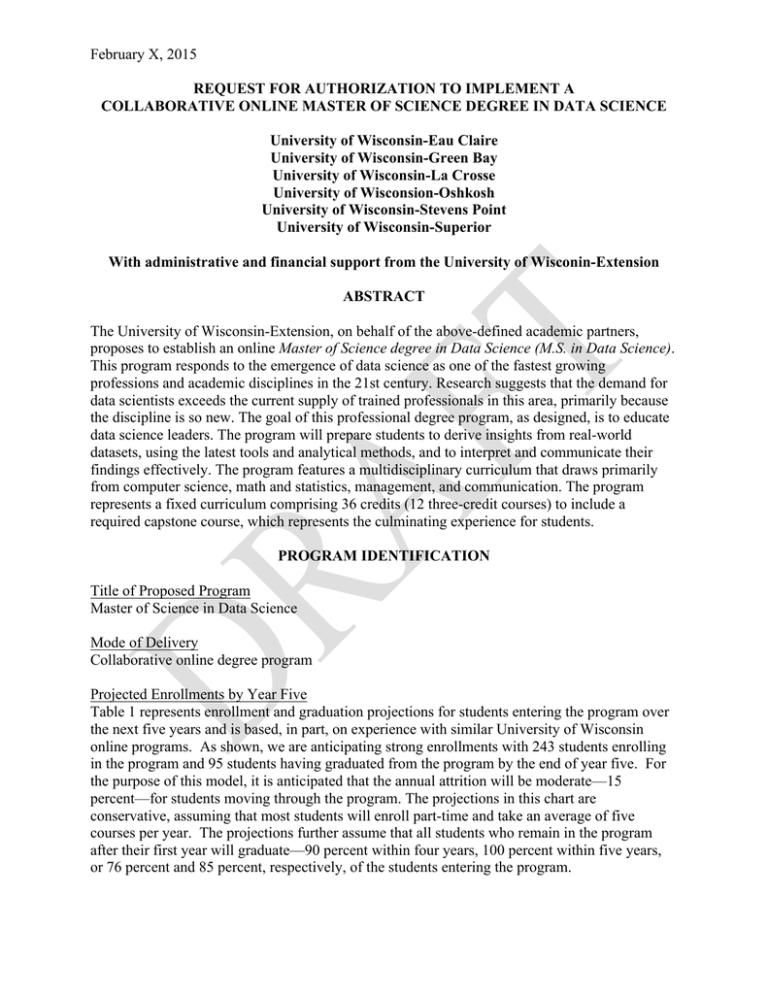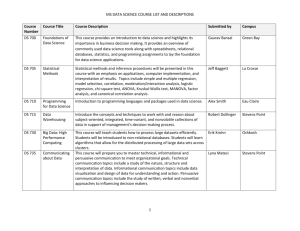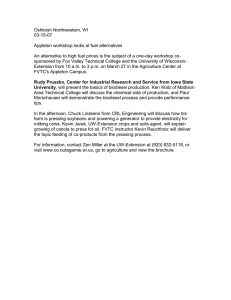February X, 2015 REQUEST FOR AUTHORIZATION TO IMPLEMENT A
advertisement

February X, 2015 REQUEST FOR AUTHORIZATION TO IMPLEMENT A COLLABORATIVE ONLINE MASTER OF SCIENCE DEGREE IN DATA SCIENCE University of Wisconsin-Eau Claire University of Wisconsin-Green Bay University of Wisconsin-La Crosse University of Wisconsion-Oshkosh University of Wisconsin-Stevens Point University of Wisconsin-Superior With administrative and financial support from the University of Wisconin-Extension ABSTRACT The University of Wisconsin-Extension, on behalf of the above-defined academic partners, proposes to establish an online Master of Science degree in Data Science (M.S. in Data Science). This program responds to the emergence of data science as one of the fastest growing professions and academic disciplines in the 21st century. Research suggests that the demand for data scientists exceeds the current supply of trained professionals in this area, primarily because the discipline is so new. The goal of this professional degree program, as designed, is to educate data science leaders. The program will prepare students to derive insights from real-world datasets, using the latest tools and analytical methods, and to interpret and communicate their findings effectively. The program features a multidisciplinary curriculum that draws primarily from computer science, math and statistics, management, and communication. The program represents a fixed curriculum comprising 36 credits (12 three-credit courses) to include a required capstone course, which represents the culminating experience for students. PROGRAM IDENTIFICATION Title of Proposed Program Master of Science in Data Science Mode of Delivery Collaborative online degree program Projected Enrollments by Year Five Table 1 represents enrollment and graduation projections for students entering the program over the next five years and is based, in part, on experience with similar University of Wisconsin online programs. As shown, we are anticipating strong enrollments with 243 students enrolling in the program and 95 students having graduated from the program by the end of year five. For the purpose of this model, it is anticipated that the annual attrition will be moderate—15 percent—for students moving through the program. The projections in this chart are conservative, assuming that most students will enroll part-time and take an average of five courses per year. The projections further assume that all students who remain in the program after their first year will graduate—90 percent within four years, 100 percent within five years, or 76 percent and 85 percent, respectively, of the students entering the program. Table 1: Five-Year Projected Enrollments Students/Year Year 1 Year 2 New 29 26 Continuing 25 Total 29 51 5 Graduating Year 3 52 38 90 10 Year 4 49 67 116 40 Year 5 87 59 146 40 Tuition Structure Program tuition for the M.S. in Data Science program will be set at $675/credit for 2015–2016 and will be identical at all six partner institutions. This fixed tuition rate is based on market demand estimates as well as comparisons with other online programs in the UW System and nationally, and will be charged outside the credit plateau. This amount represents an all-inclusive fixed tuition, and students will not be charged any additional fees (such as segregated fees) as part of the program, except for the costs of their books. There is no tuition differential for out-ofstate students. If students live near their home campus and wish to pay segregated fees for the use of recreational and other facilities, they may do so. However, they will not be required to pay these fees if they do not take advantage of associated resources. This tuition-pricing approach and structure follows the current UW System pricing guidelines for distance education programs (ACIS-5.4 Revised: Programming for the Non-Traditional Market in the University of Wisconsin System, APPENDIX C: Principles for Pricing Distance Education Credit Courses, Degree and Certificate Programs). Department, College, School, or Functional Equivalent This is a highly collaborative, interdisciplinary program that follows a home campus model (i.e. students identify/select a home campus to receive academic supports and from which the degree is conferred). The departments and schools/colleges that will offer courses for this program at each institution are as follows: • At the University of Wisconsin-Eau Claire, the M.S. in Data Science degree will be housed in the Department of Mathematics within the College of Arts and Sciences. • At the University of Wisconsin-Green Bay, the M.S. in Data Science degree will be housed in the Department of Management Information Systems/Statistics within the Austin E. Cofrin School of Business. • At the University of Wisconsin-La Crosse, the M.S. in Data Science degree will be housed in the Department of Mathematics in the College of Science and Health. • At the University of Wisconsin-Oshkosh, the M.S. in Data Science degree will be housed in the Department of Computer Science in the College of Letters and Science. • At the University of Wisconsin-Stevens Point, the M.S. in Data Science degree will be housed in the Department of Computing and New Media Technology within the College of Letters and Science. • At the University of Wisconsin-Superior, the M.S. in Data Science degree will be housed in the Business and Economics Department. 2 UW-Extension Division of Continuing Education, Outreach and E-Learning provides administrative and financial support for the program. UW-Stevens Point will serve as the lead institution representing the collaborative when seeking accreditation through the Higher Learning Commission (HLC). Proposed Date of Implementation September 2015 (tentative) pending approval by UW System and the Board of Regents. INTRODUCTION Rationale and Relation to Mission The online M.S. in Data Science degree program contributes directly to the institutional mission of the University of Wisconsin System and its campus affiliates by supporting all three elements of the UW Growth Agenda: • Increase the number of degree holders in Wisconsin. • Increase the number of high-paying jobs. • Build stronger communities. The online M.S. in Data Science provides a degree in a recognized high-need area as supported by research that included extensive input from employers throughout the state, and develops competencies that will enable graduates to contribute immediately to serve this important function and role within the Wisconsin workforce. It is a degree targeted at adult and nontraditional students possessing a bachelor’s degree, and thus broadens access for alumni and others to the university environment. The online M.S. in Data Science also supports the institutional missions of the six partner campuses by contributing to the core of liberal education by developing communication, critical thinking, problem solving, analytical skills, leadership, teamwork, and collaboration skills. Furthermore, this will be a multidisciplinary degree that helps build bridges between disciplines and develops students’ abilities to think in terms of systems and interrelationships, and within complex organizations. Current Market/Student Demand Because of the ongoing explosion of “big” data, companies have more information available than ever before but lack the people with the training necessary to translate it in ways that better inform business decisions. A recent Education Advisory Board (EAB) Custom Research Brief (November 2012) identified significant market demand for data science/analytics professionals, including business analysts, data analysts, database administrators, software engineers, programmers, and project managers. This research was informed by the research firms’ internal and online research libraries, data from other higher education institutions, current national job postings, and other industry sources. For current data science positions, it was identified that bachelor’s degrees are sufficient, although management positions now more frequently require advanced degrees and more years of professional experience. According to a recent market analysis report by McKinsey Company (McKinsey Global Institute, 2014), the United States alone faces a shortage of 140,000 to 190,000 people with analytical expertise and 1.5 million managers and analysts with the skills to understand and make decisions based on the analysis of big data. The above sources identify the most prominent employers of data scientists to include 3 technology firms, consulting firms, government contractors, advertising, financial services, healthcare, retail, ecommerce, and social media. In October 2013, UW-Extension facilitated an industry focus group representing ten professionals from diverse industry sectors within Wisconsin to solicit and secure their input on current industry needs and existing workforce competency gaps. In addition, six individual focused interviews were conducted with state and national professionals from within the field to include those representing prominent professional associations such as the Data Management Association International, the Wisconsin Data Management Association, and the Association for Digital Analytics. In these discussions, several common themes arose that provided justification for degree development and informed curriculum planning: • Significant shortfall in the local and regional labor market of individuals with data science skills…Demand is overwhelming while the current talent pool is very small • Companies having a difficult time finding data scientists with relevant skills • Recognized gaps in existing academic programs • Significant need for and interest in an advanced degree in the field • Current employees in this field have degrees from multiple and diverse disciplines and receive significant on-the-job training • Need for an advanced, high-profile, specialized degree (but not a traditional MBA) • Degree needs to include experiential learning opportunities such as practicum, capstone experience, or internships • Degree will need to provide students with a cross-disciplinary technical and scientific background that emphasizes mathematics (including applied and advanced statistics), computer science, communication (personal and technical), and business. Because it is a new and emerging field and occupation, the U.S. Department of Labor Bureau of Labor Statistics (BLS) has not yet identified the job title data scientist as a specific occupation and, as a result, job-specific detail is not available related to compensation, employment outlook. or other established employment categories. A review of the current BLS database of occupations and related descriptions suggests a close association between a data scientist and an operations research analyst. The site identifies 2012 median pay for the operations research analyst at $72,100 per year, entry-level education as a bachelor’s degree, and a 2012-2022 job outlook as 27 percent greater than average. A national Data Scientist Study conducted by EMC², an international consulting firm, concludes that despite the growing opportunity, demand for data scientists is outpacing the supply of talent and will do so for the next five years. The study also identified that 64 percent of companies responding identified a lack of training and resources as the biggest obstacle to data science adoption within their organizations. This translates to increasing frustration as organizations struggle to deal with and make sense of an exponentially growing volume of data. It is clear, data scientists—those with the technical abilities and analytical skills required to derive meaning from all the information—are in high demand. One of the many recognized and significant benefits of the collaborative program model is the extended reach or scope of contacts provided through the involvement of multiple academic partners located within unique markets throughout the state. Our academic partners have established significant relationships, reputation, and strength-of-brand within their individual 4 regions, which will help raise awareness of this opportunity throughout the state and expand program reach. This will ultimately result in greater success in reaching and serving students, supporting regional business needs and interests, and promoting program growth and positioning it for sustainability. It is anticipated that prospective students will present with diverse backgrounds and experiences. Based on input received from industry focus group participants (several of whom self-identified as prospective students in the M.S. in Data Science program), the majority of their recent job applicants held completed undergraduate degrees in the areas of computer science, math/statistics, business, and engineering. Industry contacts also shared that, because of a lack of formal academic programs and training in the data science area, the majority of their employee training is occurring in-house (what they referred to as home-grown talent). They also identified limited internal resources to provide ongoing and comprehensive training. All of the industry contacts shared that they would refer employees, as appropriate, to the program, and most identified having some level of tuition reimbursement support available through their organization. DESCRIPTION OF PROGRAM General Structure The online M.S. in Data Science degree program will focus primarily on adult and nontraditional students who hold an undergraduate degree and have the desire to continue their education toward a graduate degree, primarily to expand knowledge and specialized skills in this area and for career advancement. The multidisciplinary curriculum has been designed to prepare data science professionals to solve real-world problems as part of an interdisciplinary team using structured and unstructured data. A listing of program competencies and outcomes has been provided later in this document. The M.S. in Data Science is a fully online 36-credit (12 three-credit courses to include a capstone course) graduate program offered jointly by UW-Eau Claire, UW-Green Bay, UW-La Crosse, UW-Oshkosh, UW-Stevens Point, and UW-Superior. The program follows a home-campus model. Students will apply to one of the six partner institutions. Upon a student’s admittance, that institution will become the student’s administrative home for the degree through graduation. The program will have an academic director at each institution, and each campus will host two courses in the curriculum. Students will receive academic advising regarding admission and graduation requirements, and financial aid through their home institution. Faculty and academic advisers at each institution will offer virtual office hours and online chat capabilities, as well as access by telephone and email. Students will have online library access through the home institution. UW-Extension will provide administrative and financial support to the program. A program manager will be housed at UW-Extension and will work in concert with student services staff at the six partner institutions to provide general program information, problem resolution, and career advising online, by phone, or in person (for students near Madison). The program manager will be in close contact with the enrolled students and with the academic program directors to provide the hands-on active support that has been shown to be important for adult and nontraditional learners. Students enrolled in this program will have access to an extensive 5 array of online student services including writing labs, learning readiness assessments, and career advising offered by UW-Extension. Program Content During the summer of 2014, the M.S. in Data Science curriculum development workgroup, made up of faculty from each of the partner institutions, dedicated significant time to the development of a targeted and powerful program curriculum. This process and ultimate product were significantly enhanced with input from representatives from diverse industry sectors including financial services, retail, insurance, manufacturing, healthcare, and education. The curriculum closely complements what have been identified as typical data science tasks to include, but not limited to, the identification and interpretation of rich data sources, the management of large amounts of data, the merging of data sources, ensuring consistency of datasets, creating visualizations to aid in understanding data, building mathematical models using the data, and presenting and communicating the data insights/findings to diverse expert and non-expert audiences. Specific program competencies and outcomes have been summarized below. Student Learning Outcomes Competencies and associated learning outcomes for the program are represented as follows. Competency A: Identify and assess the needs of an organization for a data science task. • Students will be able to conduct a needs assessment. • Students will be able to frame tasks in the context of organizational goals. • Students will be able to communicate data science options and limitations that could meet organizational needs. Competency B: Collect and manage data to devise solutions to data science tasks. • Students will be able to collect, clean, and prepare data. • Students will be able to evaluate data in terms of source, volume, frequency, and flow. Competency C: Select, apply, and evaluate models to devise solutions to data science tasks. • Students will be able to identify and classify relevant variables for data science tasks. • Students will be able to choose and apply tools and methodologies to solve data science tasks. • Students will be able to assess the model used to solve data science tasks. Competency D: Interpret data science analysis outcomes. • Students will be able to interpret data, extract meaningful information, and assess findings. • Students will be able to evaluate the limitations of data science findings. Competency E: Effectively communicate data science related information effectively in various formats to appropriate audiences. • Students will be able to write, format, disseminate, and orally communicate technical materials. • Students will be able to help non-technical professionals visualize, explore, and act on data science findings. • Students will be able to facilitate data-informed discussions through listening, questioning, and presenting. Competency F: Value and safeguard the ethical use of data in all aspects of the profession. • Students will be able to identify and analyze social, legal, and ethical issues in data science. 6 • Students will be able to interpret and apply a professional code of ethics relevant to the data science profession. • Students will be able to interpret the activities and choices of others within an ethical framework and determine an appropriate action based on standards of professional conduct. Competency G: Transform findings from data resources into actionable business strategies. • Students will be able integrate data science capabilities into the formation of a situation analysis. • Students will be able to explain how data assets can be used to develop competitive advantage. • Students will be able to identify and appraise the leadership and management skills required to direct a team of data science professionals toward meeting organizational goals. Assessment of Student Learning Outcomes The assessment of student learning outcomes for the M.S. in Data Science degree program will be managed by an assessment team composed of the six academic program directors from each partner campus as well as the program manager. This team also serves as the oversight and decision-making body for the program. The team will meet biannually in person; however, teleconferences may be used to meet more frequently if need arises. The assessment team will identify and define measures and establish a rubric for evaluating how well students are meeting the program’s seven competency areas. The team will also identify what data will be needed and serve as the collection point for the data. As a part of the course development process, the assessment team will determine which examples of student work will be most appropriate to demonstrate competency in a specific student learning outcome. Program graduates will be surveyed to determine success in securing employment related to the major, and regarding the types of roles and careers that graduates have entered. The assessment team will also receive data collected by UW-Extension each semester. UWExtension will collect and monitor data on new enrollments, retention rates, and graduation rates. Because this program is part of the UW System Growth Agenda and the Adult Student Initiative, pertinent student demographics will also be collected to determine whether the degree is reaching adult students, and whether students in the program are part of a traditionally underserved demographic (as defined by the UW System). The assessment team will compile these various sources of data and complete an annual report summarizing the data, the assessment of the data, and decisions regarding improvements to the curriculum, structure, and program delivery. The report will be shared with the faculty of the program and other stakeholders. Decisions of the assessment team will go through the normal curricular processes at each partner institution. The assessment team is responsible for ensuring that recommendations for improvement are implemented. Student services, instructional, and business office personnel from each institution will also meet annually to review processes and concerns, and to make adjustments as necessary. Program evaluation regarding the collaborative nature of the model will help assess processes critical to 7 the success of the collaboration, such as the financial model, student recruitment and advising, admission and enrollment processes and trends, and curriculum design. Program assessment and evaluation occur on a more frequent schedule than in traditional academic programs. The M.S. in Data Science program will go through an informal program and fiscal review three years following degree implementation. Based on those discussions, recommendations will be made related to the continuation of the program. In addition, the program will engage in a five-year review as required by UW System. Designated Program Planning and Review Liaisons at each of the partner campuses will be invited to participate in these review processes. Program Curriculum The M.S. in Data Science program represents a fixed curriculum comprising 12 three-credit courses to include a capstone course (36 credit total). Graduates will leave the program as professionals with expertise in a number of specialized areas to include data mining and warehousing, predictive analytics, statistical modeling, database infrastructures and data management, machine learning, and more. A complete course listing with abbreviated descriptions is summarized as follows (see Attachment C for a listing of courses with detailed descriptions): Course Number DS 700 DS 705 DS 710 DS 715 DS 730 DS 735 DS 740 DS 745 Course Title Course Description (abbreviated) Host Campus Foundations of Data Science Statistical Methods Introduction to data science and its importance in business decision making Statistical methods and inference procedures presented with an emphasis on applications, computer implementation, and interpretation of results Introduction to programming languages and packages used in data science Introduction to the concepts and techniques to work with and reason about subject-oriented, integrated, time-variant, and nonvolatile collections of data in support of management’s decision-making process Overview of how to process large datasets efficiently to include introduction of non-relational databases Green Bay Prepares students to master technical, informational, and persuasive communication to meet organizational goals Covers various aspects of data analytics Stevens Point Data mining methods and procedures for diagnostic and predictive analytics Ethical issues related to data science, including privacy, intellectual property, security, and the moral integrity of inferences based on data Procedures and techniques for using data to inform the decision-making process are covered Eau Claire Programming for Data Science Data Warehousing Big Data: HighPerformance Computing Communicating about Data Visualization and Unstructured Data Analysis Data Mining DS 760 Ethics of Data Science DS 775 Prescriptive Analytics 8 La Crosse Eau Claire Stevens Point Oshkosh Green Bay Oshkosh La Crosse DS 780 DS 785 Data Science and Strategic Decision Making Capstone The interaction between data science and strategic decision making. Leveraging data resources for competitive advantage in the marketplace Students will develop and execute a data science project using real-world data, and communicate results to a nontechnical audience Superior Superior The curriculum planning workgroup has identified the following course prerequisites: • Elementary Statistics • Introduction to Programming • Introduction to Databases Aptitude tests (GRE, GMAT, other) will not be required. Institutional Program Array There is consensus among the six academic partners that the M.S. in Data Science degree program will serve as a valuable complement to the existing graduate program array at each of their institutions and will not compete with any program currently offered. Other Programs in the University of Wisconsin System A comprehensive search of current graduate-level degrees or specializations in the areas of data science, predictive analytics, business analytics or related areas within the UW System yields no same or similar program to the M.S. in Data Science currently offered. It is clear that a gap exists within the state consistent with what our research suggested. There are a small number of graduate degrees within the System that demonstrate minimal overlap in courses and/or course topics. However, none of these offerings is provided in a fully online format targeting working adults. An example of this would include the recently approved and introduced Master of Science in Computer Science degree offered in a hybrid delivery format through UW-River Falls. This program includes several common or similar courses to those offered in the M.S. in Data Science curriculum. The MS in Data Science curriculum planning workgroup did identify several similar regional graduate programs in the area of data science or related topics (only two of which were offered in an online format) that not only informed our planning but also assisted us in developing a unique online offering for professionals in this subject area. These programs includ the following: • DePaul University (IL), Master of Science in Predictive Analytics (online) • Northwestern University (IL), Master of Science in Predictive Analytics (online) • University of Minnesota, Master of Science in Business Analytics (face-to-face) • University of St. Thomas (MN), Master of Science in Data Science (face-to-face) Collaborative Nature of the Program The M.S. in Data Science is a collaborative degree program that benefits from the shared resources of all partner institutions. UW System encourages and supports system-wide cooperative and collaborative efforts among institutions as one means to develop need-based programs of mutual interest, benefit, and value to all partners; add to the existing base of quality academic offerings within the System; and, more effectively and efficiently address the needs of both traditional and nontraditional learners, as well as employers within the state. This degree, 9 like other collaborative programs currently offered within the System, provides each of the participating academic institutions the ability to offer a high-quality, sustainable program without a requirement to extend significant local resources or a risk of compromising existing programs. Six partner campuses (UW-Eau Claire, UW-Green Bay, UW-La Crosse, UW-Stevens Point, and UW-Superior) collectively contributed in the development of the program curriculum and competencies. All 12 courses have been approved at each of the partner institutions. UWExtension will provide administrative support, financial investment, marketing, and student services for the program. Although students choose a home institution where they receive the degree, all of the courses are developed and housed at UW-Extension. This cohesive development and offering of courses will ensure students have a consistent experience even though the faculty reside at the different partner institutions. All courses will be listed in the campus registration systems. All partners will share equally in the net revenues from the program. In addition, the program will continue to engage external input and advice through a program Advisory Board consisting of 12 to 15 representatives from industry who will also serve as ambassadors and referral agents to the program. The academic directors from each of the six partner campuses will also hold seats on the board. The M.S. in Data Science Advisory Board will meet biannually. Program faculty will be invited to attend and participate in the meeting. The board members will also be asked to help host students working on capstone projects, and to help create school-to-work transitions so that as students graduate from the program, they will move to gainful employment. The program manager will provide assistance to the board, coordinate meetings, and so on. The academic directors of the program and program manager will engage with board members and ensure that the board is connected to the program in constructive and positive ways. Board meetings will provide opportunities to present program progress and successes, and to gather feedback regarding changes in the industry and how those changes may affect program graduates. The meetings will also help to ensure that the program stays relevant to trends in the field. Finally, it is anticipated that the program will establish several unique partnerships with various companies that represent products and tools commonly used by data science professionals that may be incorporated into the curriculum/courses. These connections will serve to better prepare and position students for success in the field upon graduation as they put their new knowledge to work. Diversity Consistent with current local efforts at all of the partner campuses, this program will strive to achieve inclusive excellence by enrolling, retaining, and graduating sufficient numbers of students from underrepresented populations; engaging faculty from underrepresented populations; implementing strategies to promote and support integration efforts; implementing multidimensional approaches to teaching and learning; and leveraging resources so that the program is able to respond to students’ evolving and growing needs. This degree will target primarily nontraditional student populations. Many students of color, first-generation Americans, first-generation college students, and low-income students are— often by necessity—nontraditional students because they have family or work responsibilities that prevent them from attending school in traditional formats. The online delivery format will 10 also provide opportunities to those students who are time and place bound (do not reside within close proximity to an existing UW institution). Hence, from its inception, this degree is designed to attract underserved students. In addition, recruitment and marketing efforts for this degree will focus on underrepresented populations. UW-Extension will leverage advertising space on multiple partner sites in the “Diversity & Inclusion Network”: BlackPlanet.com, AsianAvenue.com, MiGente.com, and others. UW-Extension will also advertise this program in minority-focused newspapers, periodicals, and websites. While the proposed degree does not project a significant number of new faculty and staff, the partner campuses will continue to be committed to recruiting a culturally diverse campus community. The program will work toward achieving equity in the gender distribution of faculty, and faculty of color will be encouraged to participate in this program. UW-Extension has several initiatives currently underway to attract more students of color into the UW System. Through UW HELP, brochures focusing on Hispanic and Hmong students are sent to those target groups. A program manager for the M.S. in Data Science program employed by UW-Extension will conduct outreach, working with employers to encourage and support the education of their employees, especially focusing on underrepresented minorities. In addition, the Advisory Board will provide support in this area by helping the program extend its reach to diverse prospective students and communities. Ensuring that diverse student populations enter the M.S. in Data Science program is important, but equally important is providing the support services that students need to feel comfortable and able to succeed. The UW-Extension student adviser will work closely with all students to selfidentify barriers to their success to either help them overcome those barriers directly or to point them to campus and other resources that will be of assistance to them. UW-Extension will maintain online student environments that will allow individuals from diverse ethnic backgrounds to connect with other students over both cultural similarities and over programmatic interests to help build points of commonality and understanding. Social media opportunities for student connection will be made available through Facebook, Twitter, and LinkedIn, to name a few. Simply put, an essential goal of this program is to increase both the access for diverse audiences to this degree and the success of those students once they enter the program. To ensure that this goal is met, one of the areas of assessment focuses on diversity. On the curricular side, faculty will incorporate topics and discussions related to diversity and inclusivity into courses as deemed valuable and appropriate to ensure students have an understanding of these issues and how they impact decisions. In addition, we recognize that adult students come to the learning environment from diverse backgrounds, with their bags packed full of unique knowledge and experiences, and looking for opportunities to share that knowledge with others. It follows then that the strength of this program and the success of our students is, in large part, based on our ability to attract and retain a diverse adult student audience. Projected Time to Degree Based on experience with similar collaborative offerings within the System and the typical adult student profile, it is assumed that most students will enroll part-time and take an average of five courses per year. At this rate, the majority of students would complete the program within 2 to 3 years. Students may enter the program for the spring, summer, or fall semester. Students can 11 take courses in any order with the exception of the capstone, which must be taken the final semester. Program Review Process The collaborative partners, including all six academic institutions and UW-Extension, will review the program annually. Academic directors, faculty, and administrators from all partners will have input into programmatic changes and upcoming needs. UW-Extension, as the fiscal agent for this program, will manage resources to ensure that funds are available to invest in the program as needed. The decision about how to invest in the program will be made collaboratively by all partners. As defined in the partner agreement, the program will engage in an internal 3-year review focusing on both program and fiscal matters. In addition, the program will conduct a formal 5-year review as required by UW System. Institutional Review Governance committees, academic planning council reviews, etc., types of reports and selfstudies required. Accreditation While there are no specific professional credentialing agencies for the degree program, partners will be securing authorization to offer this collaborative, online master’s degree from the Higher Learning Commission, the regional accrediting body for all six partner institutions. Each of the participating academic partners is currently under the Higher Learning Commission defined threshold for online program offerings. References Big Data: The Next Frontier for Innovation, Competition, and Productivity. (2014). Retrieved from McKinsey Global Institute website, http://www.mckinsey.com/~/media/McKinsey/dotcom/Insights%20and%20pubs/MGI/Research/Technology%2 0and%20Innovation/Big%20Data/MGI_big_data_full_report.ashx Career of the Future: Data Scientist Study Results. (n.d.). Retrieved from EMC² website, http://www.emc.com/microsites/bigdata/infographic.htm Education Advisory Board. (September 2012). Graduate Degrees and Certificates in Analytics: Competitive Landscape and Market Demand. Retrieved from www.educationadvisoryboard.com internal and online research libraries. Education Advisory Board. (November 2012). Big Data and Analytics: A Review of Programs and Employment Opportunities. Retrieved from www.educationadvisoryboard.com internal and online research libraries. University of Wisconsin System (2001). ACIS-5.4 Revised: Programming for the Non-Traditional Market in the University of Wisconsin System, APPENDIX C: Principles for Pricing Distance Education Credit Courses, Degree and Certificate Programs. Retrieved from http://www.uwsa.edu/acss/acis/acis-5.4rev_AppC.htm. Attachments Attachment A: Institutional Commitment Letter Attachment B: M.S. in Data Science Budget Template Attachment C: M.S. in Data Science Course Listing With Descriptions (Detailed) 12 Attachment A Institutional Commitment Letter 13 Attachment B M.S. in Data Science Budget Template 14 Attachment C M.S. in Data Science Course Listing with Descriptions (Detailed) Course Number Course Title Course Description Campus DS 700 Foundations of Data Science This course provides introduction to data science and highlights its importance in business decision making. It provides overview of commonly used data science tools along with spreadsheet, database, statistics and programming assignments to lay the foundation for data science applications. Green Bay DS 705 Statistical Methods La Crosse DS 710 Programming for Data Science Data Warehousing Statistical methods and inference procedures will be presented in this course with an emphasis on applications, computer implementation, and interpretation of results. Topics include simple and multiple regression, model selection, correlation, moderation/interaction analysis, logistic regression, chi-­‐square test, ANOVA, Kruskal-­‐Wallis test, MANOVA, factor analysis, and canonical correlation analysis. Introduction to programming languages and packages used in data science. Introduces the concepts and techniques to work with and reason about subject-­‐oriented, integrated, time-­‐variant, and nonvolatile collections of data in support of management’s decision-­‐making process. This course will teach students how to process large datasets efficiently. Students will be introduced to non-­‐relational databases. Students will learn algorithms that allow for the distributed processing of large data sets across clusters. This course will teach students how to process large datasets efficiently. Students will be introduced to non-­‐relational databases. Students will learn algorithms that allow for the distributed processing of large datasets across clusters. This course will prepare you to master technical, informational and persuasive communication to meet organizational goals. Technical communication topics include a study of the nature, structure and interpretation of data. Informational communication topics include data visualization and design of data for understanding and action. Persuasive communication topics include the study of written, verbal and nonverbal approaches to influencing decision makers. This course covers two aspects of data analytics. First, it teaches techniques to generate visualizations appropriate to the audience type, task, and data. Second, it teaches methods and techniques for analyzing unstructured data – including text mining, web text mining and social network analysis. Data mining methods and procedures for diagnostic and predictive analytics. Topics include association rules, clustering algorithms, tools for classification, and ensemble methods. Computer implementation and applications will be emphasized. This course explores ethical issues related to data science, including privacy, intellectual property, security, and the moral integrity of inferences based on data. Procedures and techniques for using data to inform the decision-­‐making process are covered. Topics include optimization, decision analysis, game theory, and simulation. Case studies and applications will be emphasized. La Crosse DS 715 DS 730 Big Data: High Performance Computing DS 735 Communicating about Data DS 740 Visualization and Unstructured Data Analysis DS 745 Data Mining DS 760 Ethics of Data Science DS 775 Prescriptive Analytics 15 Eau Claire Stevens Point Oshkosh Stevens Point Green Bay Eau Claire Oshkosh Course Number Course Title Course Description Campus DS 780 Data Science and Strategic Decision Making Capstone The interaction between data science and strategic decision making. Leveraging data resources for competitive advantage in the marketplace. Superior Capstone course; students will develop and execute a data science project using real-­‐world data and communicate results to a non-­‐technical audience. Superior DS 785 16






